Weather vs. Whether
What is the difference?
Weather and whether are another example of homophones. They sound the same but are spelled differently and mean different things. Knowing when to use each of these words can be difficult at times. But if you learn each word's meaning and can remember their spelling, you should not have any problems!
Weather can be both a noun and a verb.
Click Here for Step-by-Step Rules, Stories and Exercises to Practice All English Tenses
Weather
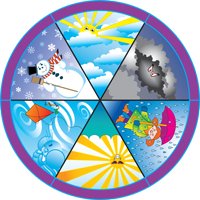
As a noun, weather refers to the conditions outdoors. Is it wet? Is it cold? Is it hot? This is the weather. It includes heat, dryness, sun, wind and rain.
Examples:
- I checked the weather for this week because I want to go to the beach.
(I checked the temperature for this week because I want to go to the beach.)

- The island of Newfoundland is commonly known for its wet and cold weather.
(The island of Newfoundland is commonly known for its wet and cold conditions.)
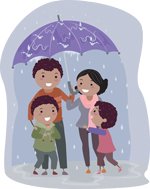
- Jake and Jack love winter weather because they can go skiing.
(Jake and Jack love winter conditions because they can go skiing.)

When weather is used as a verb, it can mean to change the appearance or structure of something that is exposed to the outdoors for a period of time. When things are left outside for a long period of time, wind and rain and sun can destroy or change them. This is weathering.
- The sun weathers and fades the cushions that are left outside.
(The sun changes and fades the cushions that are left outside.)

- My grandmother's bench is very old and weathered from being left outside for so many years.
(My grandmother's bench is very old and worn from being left outside for so many years.)

- Uncle Gerald's face looks very weathered from years of working outdoors.
(Uncle Gerald's face looks very worn from years of working outdoors.)

Weather as a verb can also mean to successfully come through a difficult situation (like a storm) without being damaged too much. It refers to facing some difficulty and passing through it.
- Joey weathered the storm the best he could.
(Joey faced the storm the best he could.)

- A long time ago, sailors had to weather many storms without any technology to help them.
(A long time ago, sailors had to get through many storms without any technology to help them.)

- We are able to weather even the most difficult of storms if we stay positive and persevere.
(We are able to get through even the most difficult of storms if we stay positive and persevere.)

Collocations
Collocations are phrases in English that are used quite commonly in dialogue and speech. Learning collocations will allow you to speak more naturally and help you in understanding others.
Weather Collocations
- Weather the storm (to be strong and face something difficult)
Examples:
- Our grandfather weathered whatever storm came his way.
- Sylvia weathered plenty of storms in her lifetime.
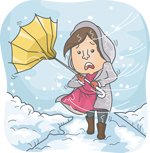
- Good/bad weather
Examples:
- We had good weather during our summer holidays.
- It's going to be bad weather this week.

- Weather permitting
Examples:
- They will be having the dance outdoors, weather permitting
- Weather permitting, we are going to have a great time this weekend.
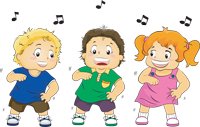
Whether
Unlike weather, whether is not a noun or a verb. Instead, whether is a conjunction. In grammar, conjunctions are words that are used to connect two sentences or words within the same sentence. Words like and, if, or, and but are examples of conjunctions.
Weather is used to show two alternatives. If you are trying to express two options to someone, you can use whether to do so. Often whether is used in situations where doubt is being expressed. If you are uncertain about two things, you are uncertain whether one is better than the other.
Examples:
- I didn't know whether I should stay or go.
(I didn't know if I should stay or go.)

- It's hard to tell whether the team will win or lose.
(It's hard to tell if the team will win or lose.)

- Gary didn't know whether the ice was thick or not.
(Gary didn't know if the ice was thick or not.)
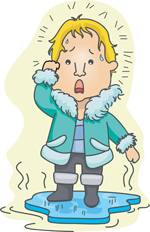
Weather is also used to show that something is true in two cases. It doesn't matter what the cases are, it is still true.
Examples:
- It will take you a long time whether you drive or fly.
(It will take you a long time no matter if you drive or fly.)

- It's going to happen whether you like it or not.
(It's going to happen even if you like it or not.)

- Whether they win or lose, the team is going to be happy anyway.
(No matter if they win or lose, the team is going to be happy anyway.)
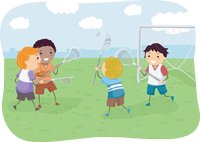
More Tips
Though weather and whether sound the same and are spelled similarly, their uses are very different. The word weather is always used to refer to conditions outside. So try to always associate the word and its spelling to things like rain, sun and temperature. If you remember that association, you should always know when to properly use weather and whether.

A Story to Practice Weather vs. Whether
Johnny wants to play outside but the weather forecast says it is supposed to rain. Johnny doesn't know whether to go outside with his friends or to stay inside and play video games.
Johnny loves to play outside when the weather is sunny and warm. Even when the weather is cool, he doesn't mind playing outside. He runs around with his friends and they stay warm, whether it's cold outside or not.
In the winter weather, Johnny and his friends weather the cold and play in the snow. They build snowmen and have snowball fights. Some of Johnny's friends don't like having snowball fights because sometimes Johnny throws balls too hard. But Johnny throws them anyway, whether they like it or not!
Johnny wants to go outside today and play in the woods with his friends. When the weather is nice, they don't know whether to play cops and robbers or hide and seek. Those are their favorite games. But when the weather is rainy, they stay inside. Often, they don't know whether to play Super Mario or Mario Kart! Those are their favorite video games.
Today Johnny doesn't feel like playing video games. He wants to go outside, whether the weather is wet or dry. Johnny decides he will go outside and weather whatever weather comes today. He will play whether his friends join him or not!

Quiz
Answer the following 10 questions and then check your answers. Each question is worth 10 points.
- My grandfather loves fishing so much that he ___________ (weathers / whethers) whatever weather is coming.
- Sarah is unsure ___________ (weather / whether) to walk or ride the bus to school this morning.
- There is lots of snow in this week's ________ (weather / whether) forecast.
- There was a storm approaching but the sailor had to wait and _______ (weather / whether) whatever would come.
- Jennifer didn't know what the temperature outside was today so she was unsure _________ (weather / whether) she should wear sandals or shoes.
- Diane loves running and never stays home for bad ________ (weather / whether).
- I am going to weather whatever comes _________ (weather / whether) it is good or bad.
- I'm unsure __________ (weather / whether) to leave tomorrow or today.
- Can you check the _________ (weather / whether) for today?
- Driving in bad _________ (weather / whether) is not very safe.
Answer Key
1. weathers | 2. whether | 3. weather | 4. weather | 5. whether | 6. weather | 7. whether | 8. whether | 9. weather | 10. weather
Get Updates, Special Offers, and English Resources
Download your FREE GIFT (the first two chapters of
English Short Stories Book and Workbook)
as soon as you join!

By submitting your email, you consent to receiving updates and newsletters from us and to the sharing of your personal data with third parties for the purposes of sending you communications. We will not spam you. You can unsubscribe at any time. For more information, please see our privacy policy.





